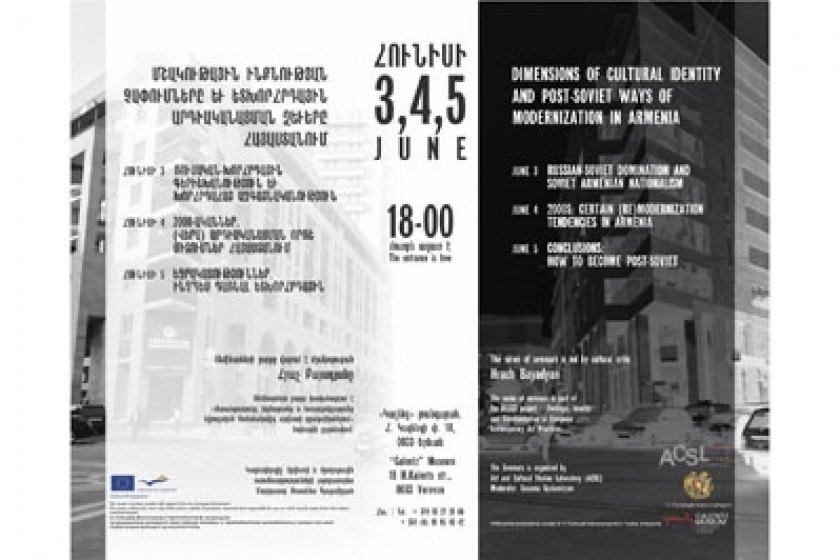
Seminars: Dimensions of Cultural Identity and Post-Soviet Ways of Modernization in Armenia
Dimensions of Cultural Identity and Post-Soviet Ways of Modernization in Armenia (three seminars)
1. Russian-Soviet Domination and Soviet Armenian Nationalism
2. 2000s: Certain (Re)Modernization Tendencies in Armenia
3. Conclusions: How to Become Post-Soviet
The series of seminars is led by cultural critic Hrach Bayadyan.
The seminars are organized by Art and Cultural Studies Laboratory (ACSL) www.acsl.am
Moderator: Susanna Gyulamiryan
Dates: June 3, 4, 5, 2012 at the Kalents Museum (18 H. Kalents Street, Yerevan; adjacent to Baghramyan Metro) For further info: Tel - 27-31-66; 091-95-43-42.
Start time: 6pm
The seminars are organized in the framework of the international project HEICO – Heritage, Identity and Communication in European Contemporary Art Practices www.atlantisprojects.eul
Building on the already existed Atlantis Network of European art institutions, the project “Heritage, Identity and Communication in European Contemporary Art Practices” fosters cross-border cultural exchange as well as the examination of the own identity in relation to the identity of partner countries and their political and cultural heritage.
The partners implement five cross-linked exhibitions in Potsdam, Plovdiv, Tbilisi, Chisinau, Bratislava and the series of seminars in Armenia. The project promotes exchange between artists through residential programs in Plovdiv (Bulgaria), Yerevan (Armenia), Tbilisi (Georgia) and Bratislava (Slovak Republic). The results of the programs are presented in country exhibitions (www.atlantisprojects.eu/).
This project has been funded with support from the European Commission. The seminars reflect the views of the author only, and the Commission cannot be held responsible for any use which may be made of the information therein.
The seminars are partially supported by the Ministry of Culture of RA.
Thanks to the "Kalents" Museum
--------------
In these three seminars I try to give an overall summary of my recent articles that concern the issues of Eastern Armenian cultural identity. The main stimulus behind this work has been the desire to understand the complex post-Soviet situation with its cultural, social, and political aspects. This desire has led to an interest in the central themes and some decisive developments of the past two centuries that have been, although fragmentarily, reflected in my work.
Here the core theoretical-interpretational framework is the modernization, to the extent to which the Eastern Armenian history of that period can be viewed from the perspective of its relation, at least as a certain elitist project, to the Western processes of modernization. This framework is used taking into account the vast number of critical revisions done, particularly, from the viewpoint of Postcolonial studies.
However, for the Eastern Armenians the era of modernization was inseparably linked to the Russian orientation, as it was also the era of Russian-Soviet domination. Moreover, the Russian orientation goes beyond being just an orientation and gradually conquers the whole historical-cultural horizon of the Eastern Armenians (Russian Armenians).
In my opinion, this circumstance becomes highly urgent in the post-Soviet Armenia and can be viewed as, for instance, a problem of overcoming the Russian-Soviet cultural dominance or a problem of cultural decolonization. If the extended viewpoint on modernity (“alternative modernities”, for instance) allows to consider the experience of Soviet Socialism and, thus, the history of post-Soviet societies in the context of global transformations of the time, then, at the same time, it implies adoption of new theoretical-methodological approaches.
In this regard, I will briefly present those sectors of the research that seem to be most relevant for this purpose: Postcolonial studies and Cultural studies. Moreover, we will discuss a number of key concepts: postcolonialism, Orientalism, hegemony, nationalism, and so on. (Hrach Bayadyan)
---------------
Hrach Bayadyan is a cultural critic living and working in Yerevan, Armenia. He is a lecturer at the Yerevan State University, leading the “Communication, Media and Society” Master’s programme at the Department of Journalism. Along with other courses, he teaches “Media and Cultural Studies”. His recent articles are related to such issues as political, social, and cultural implications of information and communication technologies, post-Soviet media culture and transformations of urban spaces, as well as Russian-Soviet orientalism and cultural identity. Among his recent publications are: Articles “Boredom” and “Hierarchy” for the book “Atlas of Transformation”, JRP-Ringier, 2010 (Project “Monument to Transformation 1989-2009”, Tranzit, Prague); Becoming Post-Soviet, Series: Documenta 13: 100 notes – 100 thoughts, No. 059, Hatje Cantz, 2012. PHD on Mathematics.
 Videos
Videos Photos
Photos




Comments (1)
Write a comment